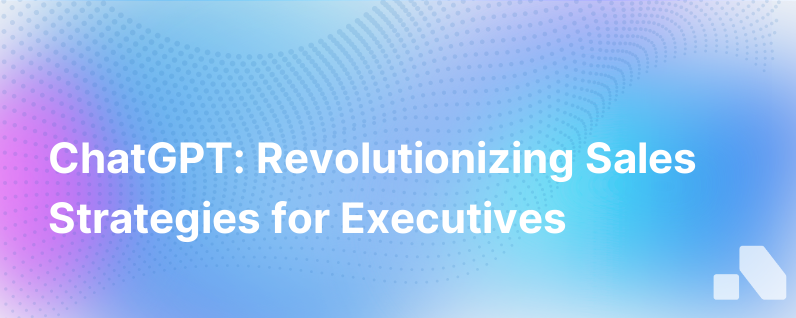
In an economy where data is king and the customer experience reigns supreme, sales teams across industries are turning to technology not just for efficiency, but also for a competitive edge. Chatbot technology, and more specifically, natural language processing models like ChatGPT, have opened new avenues for boosting sales performance and deepening customer engagement.
How can a platform like ChatGPT transform the sales process? This exploration unveils the multifaceted ways in which AI-powered conversation agents are redefining sales.
What is ChatGPT?
ChatGPT is a state-of-the-art language generation model developed by OpenAI, trained to understand and generate human-like text based on the input it receives. It's the progeny of the GPT (Generative Pretrained Transformer) lineage and is adept at performing a variety of language-based tasks, from simple question-answering to more complex discussions. Its ability to comprehend context and produce responses that mimic human conversation makes it a potent tool for engaging with customers and optimizing sales operations.
ChatGPT's Promise for Sales
1. Elevating Customer Interactions
Sales have long been as much about the relationship as the product. ChatGPT enables round-the-clock, instantaneous communication with customers, providing them with product information, resolving their queries, and even guiding them through troubleshooting, irrespective of human resource constraints. Delivering consistent, personalized engagement goes a long way in building trust – a commodity that's hard-earned but easily squandered.
2. Streamlining Lead Qualification
Lead qualification can often become a bottleneck in the sales pipeline. By employing ChatGPT, sales teams can automate the initial stages of this process, using conversational AI to ask pre-qualifying questions, gauge customer interest, and even score leads based on the interaction. This frees up sales representatives to focus their energies on leads that show a higher propensity to buy, thereby optimizing their efforts and time.
3. Enabling Sales Teams with Real-time Data
Sales representatives often find themselves in need of quick information during negotiations or sales presentations. ChatGPT can serve as an on-demand assistant, pulling data from integrated systems to provide reps with the needed ammunition in real-time – be it competitive intel, case studies, pricing adjustments, or product specifications.
4. Enhancing Training and Onboarding
Ramping up new sales hires is another area where ChatGPT can play a crucial role. Through role-playing exercises and retrieval of information on demand, it can facilitate an interactive learning environment. By simulating various customer interaction scenarios, it helps sales teams hone their pitch, rebuttals, and closing tactics.
5. Analyzing Sales Calls
Applying NLP models to analyze recorded sales calls provides actionable insights that can drastically improve a sales team's effectiveness. ChatGPT can transcribe calls, identify key points, highlight successful tactics, and even suggest areas for improvement. This data-driven approach to sales coaching ensures continuous learning and upskilling.
6. Personalizing Follow-ups
The efficacy of follow-up communication cannot be understated. ChatGPT can be instrumental in crafting customized follow-up messages that hit the right chords with prospects. It can vary language, tone, and content based on the customer's history, needs, and previous interactions, vastly improving the chances of conversion.
7. Expediting Sales Documentation
From preparing quotes and proposals to contracts and invoices, a substantial amount of paperwork is involved in sales. ChatGPT can expedite this process by generating these documents based on customizable templates, thereby reducing manual effort and accelerating the sales cycle.
8. Gathering Competitive Intelligence
Staying ahead of the competition demands knowing more than just what you offer. With its information retrieval capabilities, ChatGPT can comb through vast troves of online content, collate comparative analytics, customer reviews, and market trends to empower sales teams with a strategic edge.
9. Offering 24/7 Sales Support
The 'always-on' economy dictates that your sales force can't afford to sleep, but your human team must. ChatGPT doesn't require rest, enabling 24/7/365 customer service that can capture leads, provide product guidance, and even push for sales during off-hours.
10. Improving CRM Interaction
Maintaining accurate and up-to-date CRM records is a challenge for most salespeople who want to maximize their time interacting with customers. Integrating ChatGPT with your CRM system enables quick data entry and retrieval using conversational commands, rather than manually navigating the software.
The Balance Between AI and the Human Touch
One commonly voiced concern about incorporating AI into sales is the potential loss of the human element that is crucial to customer relationships. It's important to note that ChatGPT and similar technologies are most effective when used to enhance human interactions, not replace them. The goal is to harness AI's efficiency for routine tasks, data analysis, and initial engagement, ensuring that the human touch is allocated where it's most impactful: understanding complex customer emotions, negotiating deals, and building lasting relationships.
Conclusion
Incorporating ChatGPT into the sales process helps organizations scale their customer engagement, increase the efficiency of lead qualification, and empower their sales teams with data-driven insights and assistance. The time saved on administrative tasks allows for a deeper focus on strategy, relationship-building, and personalized service – the keystones for effective selling.
Adoption of ChatGPT in sales not only promises to elevate the bottom line, but it also sets a new standard for customer interaction, ensuring that businesses stay ahead in a rapidly evolving digital landscape. While AI might seem like a tool for the future, solutions like ChatGPT are available today and can, with the right strategy, translate to tangible benefits for sales functions of all sizes.